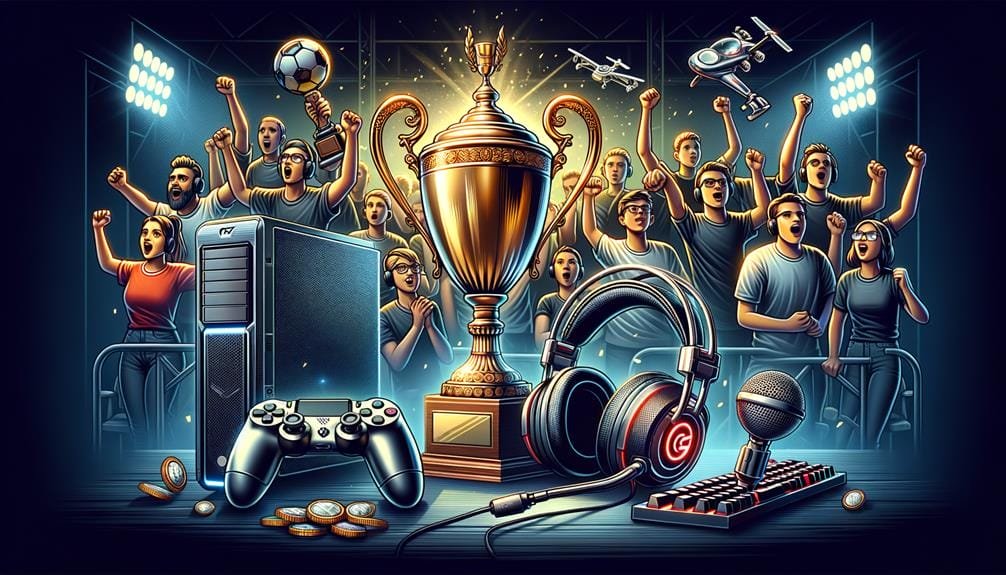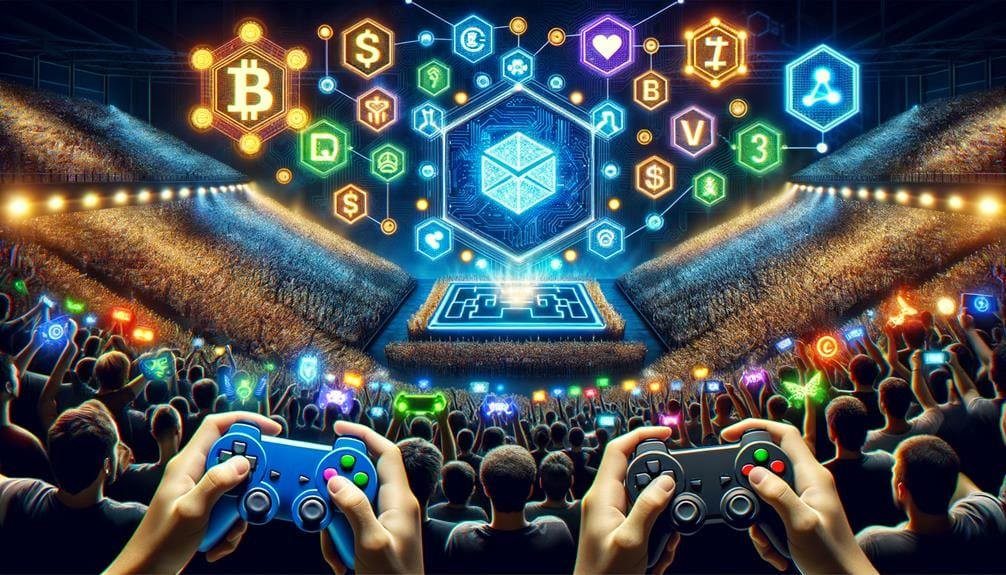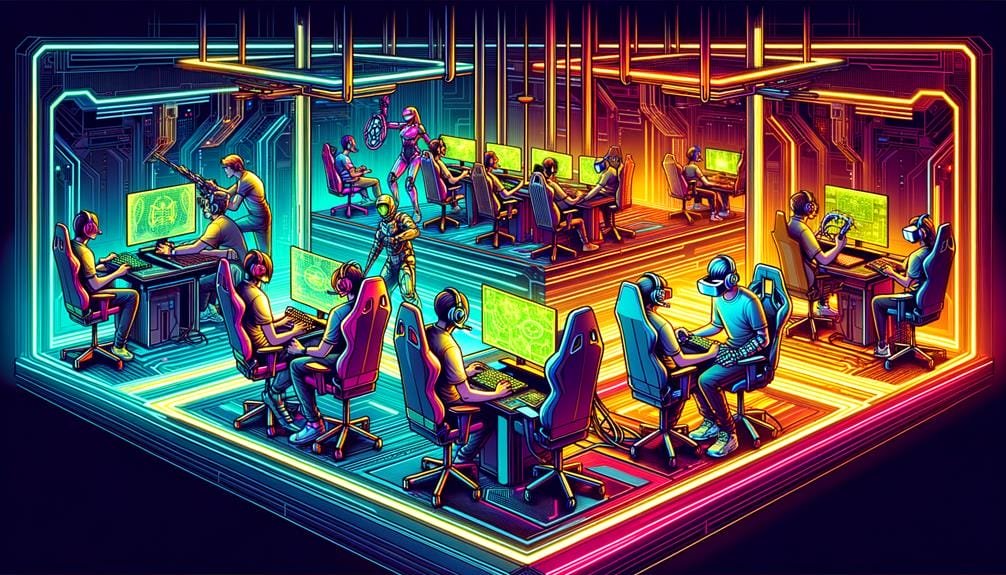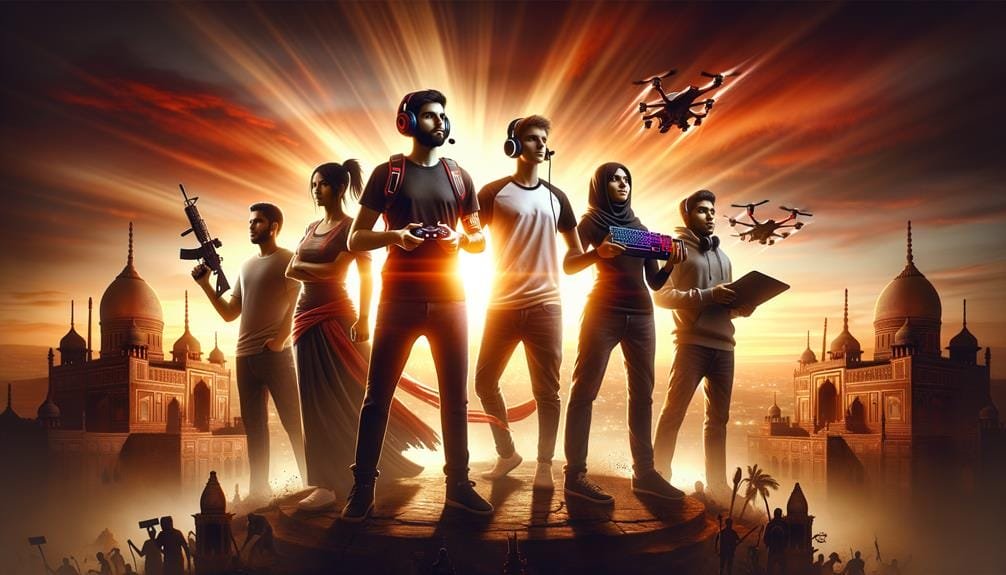Our Newsletter
Sign up for our e-mail newsletter and stay informed for what’s next on the horizon.
Similar to the transformation brought about by the advent of television in the entertainment industry, the emergence of esports is bringing about significant changes in the world of sports. We are witnessing games that were previously only played in homes and arcades, now being played professionally in stadiums filled with passionate supporters.
This shift is captivating, and esports is projected to draw a viewership of 495 million in 2020 alone. However, we must consider: What implications does this have for the future of traditional sports? Let’s have a conversation around this.
Just as the advent of television revolutionized the entertainment industry, the rise of esports is instigating substantial shifts in the world of sports. Games that were once confined to homes and arcades, are now being played professionally in stadiums teeming with fervent fans.
This transition is fascinating, and esports is expected to attract an audience of 495 million in 2020 alone. But, we must ponder, what does this mean for the future of conventional sports? Let’s engage in a dialogue regarding this.
We’re set to begin our journey into eSports, starting with its progression and growth as a competitive spectacle.
We’ll explain what eSports truly involves and examine its worldwide impact.
As we traverse this advanced universe of gaming, we’ll observe how it’s redefining entertainment and causing ripples in the international market.
What was the journey of competitive gaming, or eSports as it’s recognized presently, from the modest Atari Space Invaders Championship in 1980 to the lucrative establishments like the League of Legends World Championship?
We’ve witnessed eSports blend into traditional sports events, receive acknowledgement from countries like Russia and China, and see an increase in prize money and audience. The progression of eSports is proof of the boundless potential of technology and human competitiveness.
Venturing into the realm of eSports, it’s crucial to comprehend these are structured competitive video games, encompassing renowned genres like MOBAs, FPS, and battle royales. They have expanded beyond mere leisure activities, transforming into professional competitions with substantial viewership and prize money at stake.
| Genre | Examples | Prize Pool |
|---|---|---|
| MOBAs | DOTA 2, LoL | $40M+ |
| FPS | CS:GO, Overwatch | $1M+ |
| Battle Royales | Fortnite, PUBG | $30M+ |
South Korea played a critical role in molding the eSports landscape. Their PC bangs or gaming cafes functioned as community centers for gamers, nurturing a lively eSports culture. The prospects for eSports are immensely bright, with potential for additional mainstream acceptance.
Due to its increasing worldwide popularity, eSports has evolved from a specialized pastime into a multi-billion dollar sector, impacting the world of entertainment and altering views on traditional sports competitions.
Several crucial aspects highlight its global influence:
This shift is indisputable. We’re witnessing a digital transformation where gamers are no longer limited to their homes, but are being recognized on global platforms. The forthcoming era of eSports pledges further expansion and mainstream acknowledgment.

We’ll now focus on the principal components that constitute the eSports framework.
Ranging from individual participants and squads to high-intensity contests, the perpetually favored games, and the pivotal role of backers, all contribute to this swiftly expanding field.
These elements interact in an energetic manner, propelling the progress and evolution of professional online gaming globally.
In the expansive world of eSports, it’s the pivotal figures who mold its dynamism and competition levels. We’re referring not only to game creators and team franchises, but also to the professional gamers themselves.
Understanding the profiles of leading gamers and comprehending their role in forming eSports allows us to fully grasp the complexity and magnetism of competitive gaming.
Entering the core of the eSports domain, we encounter a group of exceptional players, each acting as a symbol of competence, strategy, and novelty in their respective games.
A crucial element in the swiftly progressing esports mechanism, professional players have significantly moulded the terrain of this fiercely contested industry. Their commitment, control, and superb skills have launched esports into international prominence.
These esports legends, through their motivating journeys from ardent novices to experienced professionals, haven’t just powered the industry’s expansion but also transformed our understanding of gaming.
In the flourishing realm of eSports, teams form the fundamental structure supporting this competitive gaming domain. We’ll examine the top eSports teams, concentrating on their intricacies and the essential elements leading to their triumph.
We’ll observe how tactics, cooperation, and individual abilities combine to form dominant teams, and how this collaboration transforms competitive gaming.
Pioneering the sphere of professional gaming, prominent eSports teams like Team Liquid, OG, Evil Geniuses, Fnatic, and Newbee haven’t just accumulated substantial earnings but also influenced the global understanding and acknowledgement of eSports.
Refocusing from solitary teams to the wider aspect of gaming, it’s impossible to overlook the significance of team dynamics and the factors that contribute to success, which are key in the arena of competitive eSports.
Strong communication, assigned roles, tactical planning, and team harmony are all fundamental elements for victory. Consistent progression and flexibility are vital in this constantly changing, technology-fueled battleground.
Let’s focus on the crucial eSports tournaments which are the foundation of competitive gaming.
The chronicles and progression of these key tournaments provide an understanding of the growth and development of the eSports sector.
We’ll also scrutinize the framework and economic aspects of these tournaments, highlighting the financial factors that have propelled the industry’s swift growth.
Venturing into the core of eSports, a few significant tournaments have marked their presence due to their historical impact, influence, and the sheer thrill they produce among gaming fans across the globe.
Tapping into the vibrant core of eSports, examining the structure and economics of essential tournaments like the League of Legends World Championship and Dota 2’s International becomes quite interesting.
These events, boasting prize pools in the millions, lure the best players from across the globe.
Funding from sponsorships, ticket sales, and merchandise invigorates these virtual arenas of conflict.
This framework keeps spectators and gamers involved, sustaining eSports’ international allure.
In the realm of eSports, select games hold prominence due to their category, the nature of their gameplay, and how they’re received in the competitive digital world.
We’ll concentrate on prominent games like League of Legends, DOTA 2, and CS:GO, and the distinctive mechanics that fuel their fame.
It’s important to underline the influence of game developers in configuring these competitive environments.
Let’s examine the varied types of games and distinct gameplay elements of leading eSports titles, ranging from tactical MOBAs to high-stakes battle royale games, attracting millions with their exciting competitive scenarios.
Delving into the core of eSports, it’s pivotal to acknowledge the essential role that game developers such as Riot Games, Activision Blizzard, and Valve Corporation have in molding the competitive gaming scene.
Their influence over game design, updates, and accessibility determines the organization of tournaments, which can potentially affect the industry’s durability.
These active developers ultimately decide how their games are engaged in a competitive manner, considerably shaping the eSports environment.
Sponsors serve as the backbone of the eSports industry, facilitating competitive gaming with financial backing and marketing know-how.
We’ll scrutinize prominent sponsors and their significant influence on tournaments, teams, and players.
Additionally, we’ll identify potent tactics that, if executed correctly, can optimize visibility, fan interaction, and financial gain for all entities involved.
In the ever-changing realm of esports, primary supporters such as tech titan Intel, gaming label Razer, and energy beverage firm Red Bull have a tremendous sway, propelling the sector’s expansion and long-term viability through significant financial inputs and promotional tactics.
Their influence is unquestionably transformative.
When examining the sphere of eSports, it’s evident that a well-conceived sponsorship plan, one that coincides with the audience’s principles and optimizes engagement, can be a game-changer in this competitive domain.
Fostering enduring relationships, inventive marketing endeavors, and product showcases are key.
This planned partnership amplifies brand awareness and strikes a chord with eSports enthusiasts, propelling prosperity in this continually changing industry.

In the sector of eSports, the commercial aspects are as lively as the gameplay itself. We’ll examine how competitive gaming generates revenue, from substantial tournament cash awards to online product sales.
Additionally, we’ll touch upon the importance of branding and advertising tactics within the eSports sphere, fundamental in enticing sponsors, gamers, and a worldwide viewership.
In the arena of eSports, generating income is a complex process. Let’s explore the diverse income sources that propel this billion-dollar industry, from endorsements and media ownership to branded goods and admissions.
Furthermore, we’ll scrutinize the financial framework that underpins eSports, emphasizing the commercial tactics that stimulate expansion and international influence.
Investigating the financial framework of eSports, it’s evident that sponsorships and advertising hold a critical position, adding significantly to the income streams of teams, events, and individual players.
The capability for income generation in eSports is vast.
Let’s explore the economic landscape of eSports, a complicated web of monetary inputs and outputs. These encompass sponsorships, promotions, media rights, merchandise transactions, ticket sales, and game publisher contributions.
As we traverse this vibrant arena, it’s evident that eSports’ economic potential is enormous, with predicted earnings set to exceed $1.1 billion. This expansion is driven by a constantly growing global audience and the profitable possibilities it offers.
We now turn our attention to the commercial aspects of eSports, particularly branding and marketing. Initially, we’ll examine potent marketing approaches for teams and events, comprehending how they cultivate a robust, recognizable brand that fans can associate with.
Following that, we’ll scrutinize case studies of triumphant sponsorship agreements, a crucial element of income generation in eSports.
In the fast-paced sphere of eSports, designing potent marketing strategies is critical for teams and events to gain recognition and achieve success. Primary techniques include:
We are witnessing a tech-fueled transformation in marketing, where data analysis and digital platforms are the keys to success.
Turning our attention from broad marketing approaches, let’s delve into specific instances of successful sponsorship arrangements in the eSports sector.
The joint venture between Red Bull and Cloud9 laid the groundwork for non-endemic brands.
Mercedes-Benz’s alliance with ESL One exhibits how an automotive behemoth has successfully permeated the eSports scene.
In the same vein, the numerous partnerships of HyperX underscore the crucial function of gaming peripheral brands in the industry.
As we delve into the culture of eSports, we’ll come across the lively community and fan involvement that powers this digital field.
We’ll also illuminate the strenuous training and committed lifestyle of professional gamers, who are the central figures of this culture.
Through this, we aim to offer a peek into the distinctive and dynamic world of competitive gaming.
Focusing on the cultural dimension of eSports is crucial. Acknowledging the impact of community interaction and fan involvement is key. The establishment of faithful supporters, along with the sway of social media and broadcasting platforms, are significant factors in this dynamic environment.
Jointly, these elements mould the culture, stimulate expansion, and nurture a feeling of unity in the eSports realm.
In the ever-changing sphere of eSports, cultivating a faithful fanbase often means fostering a strong community via gripping content and significant engagements with fans. We accomplish this by:
This methodological and technology-driven strategy propels the growth of our fanbase.
Drawing from the critical role of fan engagement, it is clear to see that social media and streaming platforms have become key in molding the eSports culture, promoting a sense of unity and boosting fan allegiance. Platforms such as Twitch and YouTube Gaming provide immediate interaction, while Twitter and Instagram link fans to teams and players.
| Platform | Role in eSports |
|---|---|
| Twitch | Live streaming, immediate interaction |
| YouTube Gaming | Broadcasting esports events |
| Linking fans with teams | |
| Distributing behind-the-scenes content | |
| Creating online communities |
Let’s shift our attention to the daily routine of professional gamers and their approach to harmonizing their stringent training with holistic well-being.
Their lifestyle integrates stern practice routines, physical health, mental wellness, and suitable diet.
We’ll also discuss how these sportspeople ward off exhaustion while upholding outstanding performance in the challenging arena of eSports.
Venturing into the daily life of an eSports athlete, we uncover a stringent regimen of training, strategic planning, and self-care routines that challenge the stereotype of the relaxed gamer.
This isn’t merely gaming; it’s a taxing, professional lifestyle.
In the demanding sphere of eSports, professional players must find a perfect equilibrium between fierce rivalry and their own physical and mental health. Strenuous practice, wise lifestyle decisions, frequent intervals, and giving importance to sleep are part of their regimen.
The eSports fraternity acknowledges the significance of mental health, offering resources and assistance to guarantee players remain on top of their game while safeguarding their well-being.

As we direct our attention to the future of eSports, it’s evident that advancements in technology will significantly influence the evolution of this sector.
The tug of war between regulatory hurdles will also have a substantial impact in plotting the course forward.
Given the ceaseless growth of eSports, there are infinite possibilities for what lies ahead.
As we progress in the domain of eSports, we’re witnessing the emergence of advanced gaming technology, specifically Virtual Reality (VR) and Augmented Reality (AR).
These improvements aren’t just altering gameplay; they’re redefining the spectator experience, creating immersive environments that transport observers directly into the core of the action.
The hurdle lies in how to incorporate these technologies effectively into eSports, ensuring they improve rather than diminish the competitive gaming experience.
Exploring the subsequent era of gaming technology, we observe how progressions are geared to transform eSports.
These technologies ensure the opening of new degrees of liberty and involvement for our tech-savvy, meticulous audience.
Investigating the field of VR and AR technologies in eSports, we encounter a bounty of possibilities for amplifying player involvement and audience interaction.
However, we also confront hurdles like cost obstacles, technical constraints, and preserving even-handed competition.
Nevertheless, we maintain a positive outlook towards the novel gaming dynamics, enhanced live event participation, and the lure of new spectators that these technological progressions pledge for the upcoming times in eSports.
In the intricate world of eSports, two significant hurdles appear: the requirement for authoritative entities and uniformity, and pressing lawful and ethical facets. An immediate demand for global regulations that can guarantee fair competition across nations, safeguarding player’s rights, and preserving the industry’s integrity is seen.
As we progress, we’ll delve deeper into these matters, shedding light on possible solutions and their implications for the future of competitive gaming.
In the ever-changing realm of eSports, regulatory bodies such as the Korean Esport Association (KeSPA) and the drive for standardization are vital in addressing regulatory obstacles. They’re establishing a well-structured, equitable competitive environment.
We aim to foster growth, safeguard player rights, and maintain fair play in eSports.
While maneuvering through the legal intricacies and moral quandaries prevalent in the eSports field, we encounter regulatory hurdles such as age limitations, betting regulations, and rights associated with intellectual property. Approaches to tackle these involve systems for verifying age, guidelines promoting fair competition, and definitive rules regarding content ownership.
It’s imperative to safeguard minors and promote fair play, while simultaneously tackling issues like match-fixing, doping, and online harassment through sturdy regulations and implementation mechanisms.
Progressing into the future, emerging markets and demographics are becoming more involved in the eSports scene, demonstrating that this isn’t just a passing trend, but a transformative industry.
The impact of eSports on education and career development is also growing, with an increasing number of institutions acknowledging the importance of competitive gaming.
This is a thrilling period, where the boundaries of eSports are broadening, ushering in both obstacles and possibilities.
The swift progression of eSports into fresh markets and demographics, such as Africa and South America, demonstrates the industry’s worldwide allure and adaptability. We’re witnessing:
These tendencies underscore the limitless possibilities of eSports.
As we venture into new opportunities and expand our audience base, it’s clear that eSports transcends mere gaming, playing a critical role in education and career advancement. This opens the doors to emerging trends and potential difficulties.
Educational establishments are now offering scholarships and courses related to gaming, nurturing abilities such as teamwork and strategy. However, we still face hurdles such as building trust and managing concerns about screen time.

In summarizing, we’ve observed the transformation and expansion of eSports into a substantial sector with a bright future.
To remain in sync with this vibrant field, we need to keep a vigilant eye on recent developments.
Significant alterations are persistently shaping the eSports environment, and comprehending these shifts can intensify our admiration for this creative world of online gaming.
Peering into the swiftly changing terrain of eSports, we’re observing a transformation in the amusement sector set to exceed $1 billion in earnings. This robust expansion is sparked by:
We’re discussing not merely the emergence of a new sport, but a cultural shift. This pertains to the liberty to select what forms entertainment and rivalry. It’s the quest for supremacy in a digital field.
As we investigate further, we’ll reveal more about this lively, tech-fueled universe and what the future reserves for eSports.
To stay current with the high-speed world of eSports, there are several approaches we can utilize. Checking out prominent eSports news websites like ESPN eSports, Dot eSports, and The Score eSports ensures we’re aware of tournament outcomes, player movements, and industry progress.
Online communities and forums such as Reddit’s r/esports and Team Liquid forums are platforms for stimulating conversations. Subscriptions to eSports YouTube channels and following teams and players on social media offer us instant updates.
A common question we receive is about the leading figure in esports. This is challenging to answer as rankings are always changing. That said, many people view Faker, a South Korean League of Legends competitor, as the best due to his sustained high performance.
Five prominent types of e-sports are League of Legends, Counter-Strike: Global Offensive, Dota 2, Valorant, and Call of Duty Warzone. They’re literally transforming the way we play!
After considering various factors, we can confirm that League of Legends holds the most prestigious position for us. Its impressive following, number of players, and the size of its prize pools outperform others, establishing it as our top selection in the sphere of gaming.
We think that any investment having potential for growth is worth a look. Just like a promising new business, esports has demonstrated major growth, and could provide substantial profits. It’s an exciting venture, much like being part of a technology transformation.
Sign up for our e-mail newsletter and stay informed for what’s next on the horizon.